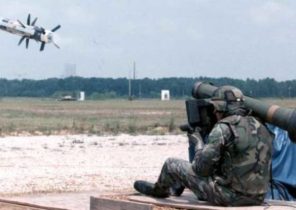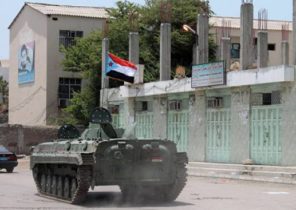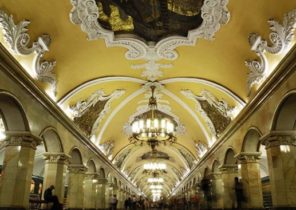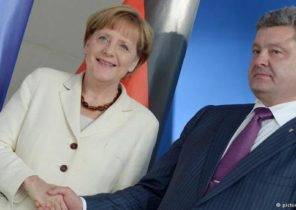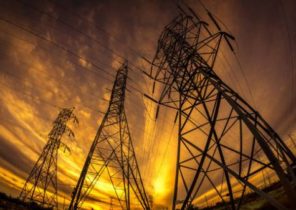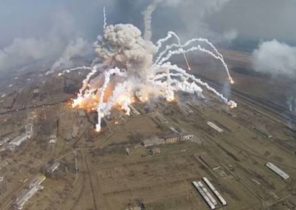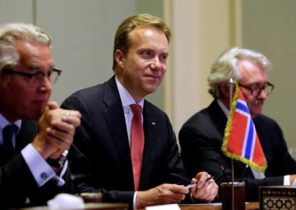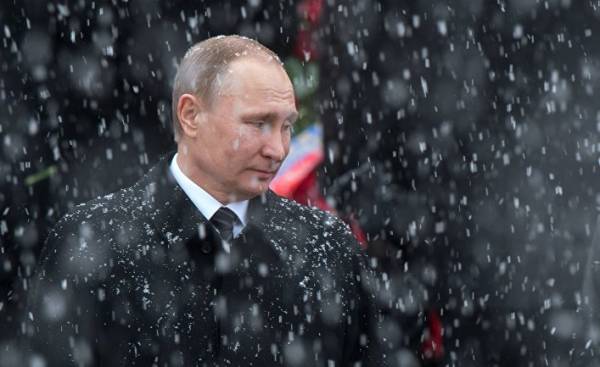
American hysteria over Russian President Vladimir Putin is gaining momentum and is unlikely to stop anytime soon. At the moment it is only indirectly related to the charges that Putin did Donald trump his “puppet” or that the tramp — or the attorney General Jeff sessions, or many representatives of the administration, in collusion with the Russian oligarchs.
You may have heard about the sudden death of Russia’s permanent representative to the UN Vitaly Churkin. We are told, that all the vile machinations of the Kremlin. In fact, this is not the first case of death of the Russian diplomat for the last time suspicious isn’t it? And by the way, while you were fixated on undermining Russia American society through psychological warfare, you may have missed the increasing influence of the country in Syria. And provoking Japan. And interference in the Affairs of England. And “sowing chaos” in the Balkans. And the Baltic States. And in Ukraine. And the possible invasion of Belarus. And Finland. And if that is not enough, Putin has a master plan the overthrow of all European and world democratic order. We could retreat and say that Russia is “ruled the world”.
Given this dominant in American political debate pretentiousness, citizens and experts rightly concerned about the possible geopolitical rivalry with Russia. But is it actually terrible and widespread the Putin regime, how it is represented?
Western experts in its comments on the issue of the ambitions of the Kremlin’s foreign policy are divided generally into two opposing camps with different starting points: some are repelled from the foreign policy of Russia, the other from internal. In their assessments and findings, both sides tend to exaggerate, though in different directions. Also it is useless to try to understand a real Russian ambition or to respond to them.
The first camp I call the “Putler” — a hybrid of Putin with Adolf Hitler, the two leaders to unite which Western experts like, it seems, more than anything. Largely due to Russia’s annexation of Crimea and intervention in Donbass 2014, this view portrays Russia as the main threat to liberal democracy: scary, aggressive, expansionist and revanchist reincarnation of the Soviet Union, headed by Putin, symbolizing the worst manifestations of authoritarianism. Rooted in historical analogy of the 20th century, especially world war II, this camp indirectly dictates the need for military confrontation — any less radical measures, including economic sanctions, akin to a weak policy of appeasement in the style of Chamberlain, to provoke a comparison with the Nazis.
Another favourite historical analogy for “putlerovtsev” is a cold war. Many observers believe that the fatal “cold war 2.0” has begun (just like they forget to mention, without the ideology of communism, the nuclear arms race, realistic policies of balancing, the global competition for controlled force or any other elements that defined the first cold war). The last statement of the speaker of the house of representatives, Paul Ryan, who called Russia a “global threat, led by an aggressive person” falls squarely within this school of thought, along with his remark that imposed by President Barack Obama sanctions were the result of too obvious policy of appeasement.
Moving from the geopolitical ambitions of Russian domestic politics, ideology “putlerovtsev” focuses on strengthening Putin’s autocratic control, rigged elections, persecution and murder of opposition journalists, restriction of civil liberties and the use of disinformation through the state media, in order to confuse the public and get control over it. This characterization of Putin as an unrestrained despot, intending to use “the absurdity and unreality” as tools to achieve their goals, borders, as often happens in such cases, with hysteria, but, presumably, attracted many online visitors.
The opposite worldview “Putler” is camp “the Dying bear”. His approach challenges posed by Russia as a threat and predicts the stagnation, corruption and decline. The term originated among specialists in demography, discouraged by the dim prospects of the Russian health system, but could also reasonably include political, social and economic constraints. No doubt, health and demographic statistics of Russia are far behind than Western Europe and the United States, given its relatively high mortality to relatively low fertility and life expectancy level rundown of African countries. In the medium and long term, this means a demographic decline: fewer Russians — less taxpayers, conscripts and public resources; this has a negative impact on the growth potential of Russia. There are many other restrictions of the Russian potential in relation to future economic growth: it is exhausted by the excessive dependence on resource extraction non-diversified economy; a growing, clumsy, corrupt and impede the entrepreneurial activities of the state bureaucracy; technological backwardness; and kleptocratic political system that encourages the promotion of their own people to positions of leadership, and the development makes it unprofitable. Without diversification and freedom of the Russian economy, we are told, “reached bottom”. Groaning under the weight of Western sanctions and low global oil prices, the Ministry of economic development of Russia until 2035 does not expect any real improvement in the quality of life.
Some followers of the camp, “the Dying bear” I think Russia’s aggression in foreign policy, including the invasion of the Ukraine and Syria, no more than attempts by Putin to distract Patriotic citizens from the misery of his own existence and to contribute to their unification around the ideas of patriotism, because it cannot ensure the legality of activities associated with the movable sky-high oil prices economic growth the beginning of 2000-ies. While the “Putler” calls for confrontation, “the Dying bear” says about the choice between control or social isolation, and even out of battle: why take Russia seriously if it is in any case doomed?
The position of the camp, “the Dying bear” reflects a dismissive public statements of President Obama that Russia is at best a “regional power”, “weak country”, which is nothing worthy “in addition to oil, gas and weapons” does not, and that international intervention is motivated “not by power, but weakness.”
The reality, of course, lies somewhere between these two extremes. Russia is not, as many fear, global threat, but the collapse is not doomed. The geopolitical power of Russia really constrained by demographic, economic, social and political weakness, but they are not as critical as they are often presented. Today the level of health and life expectancy of Russians is higher than ever. Despite the fact that reducing the number of women of childbearing age suggests long-term population decline due to mortality exceeding the birth rate in Russia recently, for the first time since the collapse of communism, was was the natural increase of the population.
From an economic point of view, the rouble has stabilised after the collapse in late 2014, and the recession of 2014-2015 statistically complete. However, not all the difficulties are left behind, as the decline in oil prices leads to a decrease in state revenues, and in the foreseeable future, and private investment, which will inevitably mean stagnation and slow growth. Russia’s economic performance is so closely associated with public expenditure that any reduction in expenses, despite a decrease in the amount of oil pumped affect the entire economy. And the economy, ultimately, limits their political options. Although the geopolitical gambits of Putin in Ukraine and Syria can improve the rating of its popularity, they occur due to the growth of poverty and wage delays, which contributes to a marked increase in labor protests across the country. With the aim of maintaining internal security, the Kremlin will have to decide which of these is easily controlled socio-economic problems by limiting the resources spent on political adventurism in Syria, in Ukraine and beyond, not to mention the investments in health, education, science and infrastructure. To all from Russia can not.
Therefore, despite the high level of interference in the Affairs of States, in the foreseeable future Russia is ready to continue to escape, and economic and demographic stagnation to constrain its noble geopolitical goals. It is not surprising that in 2020 Russia will be more like herself in 2012 or 2016, and not on the expansionist Soviet Union, 1944 or the crumbling Soviet Union in 1991. Thus, US foreign policy towards Russia should not be based neither on militarization and conflicts of the camp is “Putler,” nor the proposed “the Dying bear” social exclusion and respectful approach that recognizes the interdependence of the different strategic interests of Russia, which may conflict with Washington.
The problem, however, is that inaction — the forecast is not particularly attractive, that is not done often. Two reasons for this. The first is the lack of deep understanding of the organization of Russian control. Most experts know, looks like a liberal democracy, and —if you believe knowledge about democratization (and for skepticism there are good reasons, especially in the era of trump) — that is, stabilized, democratic system be reliable and durable. We also understand that autocracy can also be stable: just look at the longevity of the reign of Fidel Castro in Cuba or the Kim dynasty in North Korea. Much worse is the case with understanding political systems, like Russia, which is neither fully democratic nor fully autocratic. Theorists of democratization have long tried to understand similar to Russian modes of the “illiberal democracy” or “competitive authoritarian”, which combine democratic and nondemocratic elements. If liberal democracy is most favorable endpoint logical to assume that Russia is simply “stuck” in transition, instead of on their own to achieve some semblance of a stable equilibrium.
Second, observers of events in Russia, is still pursuing a legendary failure Kremlinologists to predict one of the most significant geopolitical events of the 20th century — the collapse of the Communist system and the Soviet Union — seem to have developed a special sensitivity to any economic or social grounds-the harbingers of disaster for the Putin regime. Shocked Russia in 2008, the global financial crisis was called “the end of the Putin era”. During popular protests against his re-election in 2011-2012, the experts talked about the “beginning of the end of Putin.” The revolution in neighboring Ukraine, also meant “the end of Vladimir Putin”. As it turns out, competitive authoritarian regimes in General, and Putin in particular, are usually surprisingly durable.
Considering the prominence of Russia in American political discourse, you need to soberly assess its capabilities and limitations. Russia is neither a Juggernaut nor a weak link, with which it from time to time brand. Well-reasoned policy of Russia begins with the suppression of hysteria, which lasted long enough to admit it, followed by the adoption of appropriate measures.

